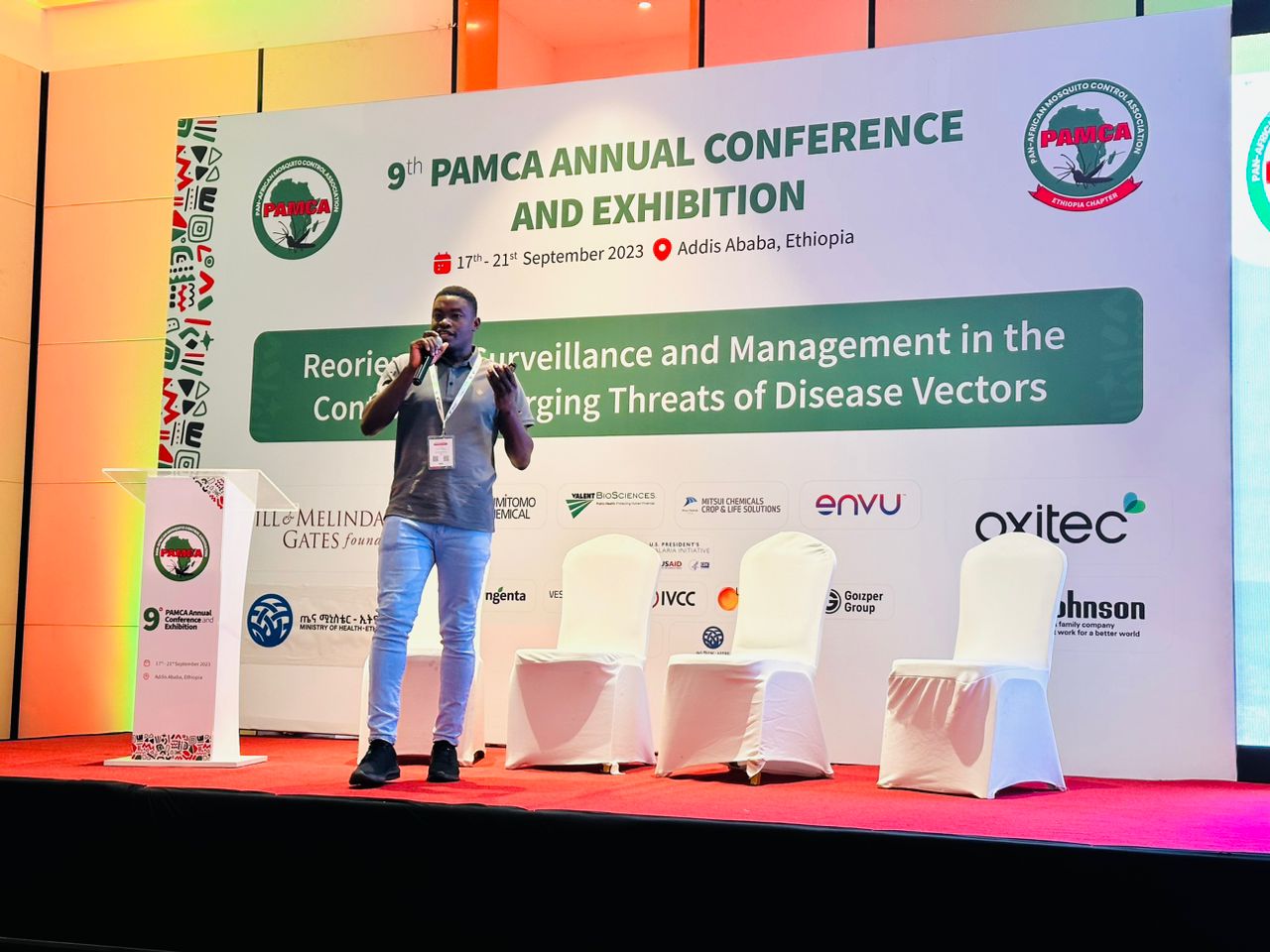
#PAMCA2023 DAY4: Final day, but the fight against malaria is on!

The fourth and final day of the PAMCA2023 conference unfolded with a compelling series of presentations and discussions that further cemented Ifakara Health Institute’s commitment to combating malaria and mosquito-borne diseases.
Speakers from Ifakara, including Emmanuel Mbuba, Dr. Mgeni Tambwe (on behalf of Prisca Kweyamba), Polius Pinda, Hamisi Kunambi, and Augustino Mmbaga, shared their insights on innovative approaches in this ongoing battle.
Innovative control technologies
Dr. Mgeni Tambwe presented Prisca Kweyamba's research on Interceptor® G2 nets containing chlorfenapyr, which effectively combat malaria in areas with insecticide-resistant mosquitoes.
These nets not only kill resistant mosquitoes but may also disrupt the malaria parasite's development, potentially improving malaria control. Further research is underway to understand this mechanism better.
Autodissemination approach
Augustino Mmbaga emphasizes the need to address insecticide resistance and Anopheles stephensi spread in Africa. The autodissemination approach (ATD), which uses gravid mosquitoes to distribute pyriproxyfen (PPF) to breeding sites, shows promise in reducing mosquito populations.
Continued research is crucial, and key factors for ATD adoption include scalable devices, optimized PPF, community acceptance, and integration with existing larviciding methods, highlighting the importance of innovative malaria control in urban and rural Africa.
Resistance in mosquitoes
Polius G. Pinda's presented their study which looked at mosquitoes in southeastern Tanzania. The study wanted to figure out if a mosquito's age, how close it was to water, and its resistance to certain insecticides were connected. People often use these insecticides to fight mosquitoes, but mosquitoes are getting better at resisting them.
This idea challenges what we thought about stopping malaria and shows we need to think about how old mosquitoes are and where they hang out when we make our plans.
Prolonged bed-net effectiveness
Emmanuel Mbuba's stressed the need for frequent replacement of ITNs to keep them working effectively. They challenge the assumption that a single net can provide prolonged protection. Additionally, they highlight the importance of evaluating ITN performance in specific settings, helping malaria programs choose the right products for their needs.
His study delved into the durability of insecticide-treated nets (ITNs) containing pyrethroid and piperonyl-butoxide (PBO) in Bagamoyo, Tanzania. ITNs are crucial for preventing malaria, but their effectiveness diminishes over time, especially when mosquitoes develop resistance to the insecticides used.
“Autodissemination” for malaria control
Hamisi J. Kunambi employed an innovative approach to target Anopheles funestus by utilizing autodissemination, which enables mosquitoes to self-disseminate pyriproxyfen (PPF), an insect growth regulator (IGR) commonly used in pest control, for the management of wild mosquito populations.
The study revealed that PPF had a notable impact on mosquito fertility and reproduction, indicating its potential as an additional control method to complement the use of long-lasting insecticidal nets (LLINs).
Young scientists scoop awards
In a moment of celebration and recognition, two members of the Data Science and Mathematical Modelling team at Ifakara scooped awards on the final day. Victoria Githu, Team Lead and a mathematical modeller, won runner up at the prestigious PAMCA Women in Vector Control (WiVC) - Excellence Awards - Early Career. The award recognizes the achievements and excellence of women who have contributed exceptionally to research, mentorship, leadership, and innovations.
Andrea Kipingu, emerged victorious in the student poster competition. Because of his well designed poster and his exceptional presentation skills, Adrea won an all expenses paid “Travel Award” to next year’s PAMCA set to take place in Côte d'Ivoire.
These remarkable achievements underscore the excellence and dedication of Ifakara's scientific community, further highlighting their commitment to advancing research in the fight against mosquito-borne diseases.
Ifakara extends its heartfelt appreciation to PAMCA for providing the institute with an invaluable platform to disseminate its knowledge and expertise. This conference has been an enlightening journey of knowledge exchange, one that strengthens our resolve and accelerates our efforts in the relentless fight against vector-borne diseases.
Together, we can transform the landscape of public health in our countries and pave the way for a brighter, healthier tomorrow.
